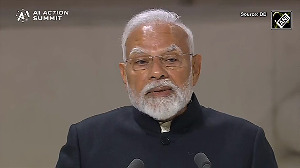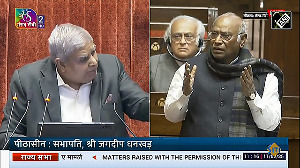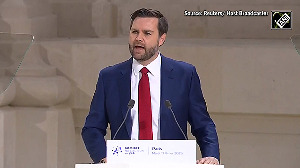With most terrorist and militant organisations, there is a clear understanding among the State's agencies about what the outfits stand for, what their short term aims are and what their long term ambition is. But that's not the case with the Maoists.
Simply put, very little is known as to just how Maoists have grown to such alarming proportions in recent years. So, when officers and officials from Maoist-hit states came together for a conference organised by the Institute for Conflict Management, to discuss strategies to combat the Maoist insurgency, a lot of time was dedicated to understanding how the organisation works and what its strategies are.
The high-level delegates of the conference put down the following as the strategies and the strengths of the Maoists.
Solid recruitment strategy:
Officials who have long been in the thick of Maoist insurgency say that the main ploy used by the outfit to recruit people is by catching them young. They say Maoists attract youngsters in the regions where they have considerable clout and involve them in some criminal activity.
"This turns the police attention towards the youngsters. Once that happens, the Maoists suck them in further involve them in graver crimes, ensuring that they can never go back to the mainstream," says a senior official with the Maharashtra government.
It is said that in many cases, the Maoists resort to threats.
Former minister in the Andhra Pradesh government Vijayarama Rao adds, "Wherever there is a discontentment, there will always be individuals, organisations and ideologies that will urge the use of violence to air their discontentment. That is what the Maoists are doing in most parts of the country today."
Fight for popular causes:
The Maoists also take up popular issues of the common man and seek to project themselves as the key to a solution. "They protest against what they perceive to be injustices meted out to the common man.," says Rao, who has also been the director of the Central Bureau of Investigation.
As a downside for the Maoists, there are not many students joining their ranks these days.
Srinivas Reddy, Senior Assistant Editor of The Hindu, Hyderabad, however says that they have begun to explore ways to figure out why.
"They have a beautiful name for it. 'Social Investigation' is what they call it. These days, there go out to the ground level and are trying to figure out why students are not joining them any more. And they have started tweaking their propaganda and tactic accordingly."
Organisational powers:
One main reason officers attribute to the rise of the outfit is their strong organisational assets. One officer from Andhra Pradesh who has been in the thick of the issue for a long time says their frontal organization is a bigger threat than their armed units. These frontal organizations are the ones who go to the ground level and shape public opinion.
"We need to device a clear strategy as to how we will counter the frontal organisations. They play a much more important role than what is thought to be," the senior Andhra Pradesh officer warns.
Rajya Sabha member Arun Shourie agrees. Shourie says there is a very urgent need to examine the fontal organisations.
"Who are behind these organisations? It is the duty of both the government and the media to find out about the people who are behind these organisations and find out what their interests are," he says.
Propaganda:
One thing that all officers are unanimous about is the notion that the media lends a more sympathetic ear to the Maoists than to the State.
"The Maoists use the media and the intelligentsia to maximum benefit. A most wanted Maoist can sit in the comforts of his hideout and issue threats to the security forces and the politicians. There is nothing that anyone can do about it because the media is too eager to go in and have his version. Such things are of no value to the public. Neither are they in public interest," an officer from Andhra fumes.
Change according to times:
The modern day Maoist is tech savvy; has all the modern weapons and is just too well informed of the issues of the day. One senior police officer, without wanting to be named for this report, says, "We were shocked to find that they were using laptops, data cards and other gadgets with ease. Any modernisation you see in the force in that aspect is the result of us having merely followed them."
Nor is the modern day Maoist going to the masses with issues like land reforms. "He talks about LPG prices, effects of globalization, multi-national companies, liberalization, The World Bank and the World Trade Organisation. They are taking up causes like real estate, SEZs and displacement," says Srinivas Reddy.
Beyond all these, the main strength of the Maoists happens to be the biggest weakness of the State -- a poor understanding of who the enemy is. During the course of the conference, one thing that the serving officers, analysts and the former officers failed to have a consensus on was about the motive of the Maoists.
While the serving officers -- those who are in the middle of the rut, fighting it day in and day out -- always invariably spoke of the Maoists as a military organisation. They saw them as a military outfit with territorial ambitions.
The former officers and top cops often described the Maoists as a political outfit driven blindly by ideology. The observers, analysts and the journalists -- who too see the problem on a regular basis but as outsiders -- felt they were a bit of both.
Shourie aptly summarized: "It is a political movement with military objectives. At the end of the day, they are all about dominance and control."
The problem with the different perceptions is the perception of the men who are in the filed, locked in a combat with the Maoists. Whatever the retired officers and the experts say, at the end of the day, what matters most is how the serving officers see the problem.
Srinivas Reddy sums up: "Right now, the State is pitted against an invisible enemy, who is engaging them in an unconventional protracted armed struggle. And we must accept that we lag behind in specific areas and address them."






 © 2025
© 2025